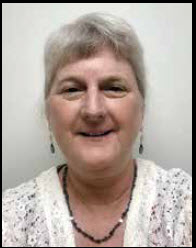 By: Lisa Philippart
By: Lisa Philippart
Trigger warning: This article contains sexual content that may cause emotional distress. Reader discretion is advised.
Have you noticed a pattern to my articles? In general, in the first article on a particular topic, I try to provide information, clarification, and details. In the follow-up article, I try to answer the question, “Now that I know this, what can I do about it?” In my last article, I attempted to provide information on whether sexually abused children grow up to have abusive/unhealthy relationships. In this article, I will attempt to provide some suggestions on ways to begin healing from childhood sexual trauma. Healing can begin at many starting points and everyone’s journey is different. It is important to find someone to talk to about your experiences and feelings, either someone you know and trust, or a professional counselor experienced in trauma work. Unfortunately, childhood sexual trauma is not gender specific (1 in 6 boys is sexually abused before the age of 16), and the average age for the first time of abuse is 8 years old. Often, survivors of childhood sexual abuse may believe that since the abuse happened so long ago, it would be better not to rehash the past. They may avoid feelings and memories in order to function in their day-to-day lives. Clues that may help you to realize that you should seek support include:
Are you reacting unusually to situations differently than before?
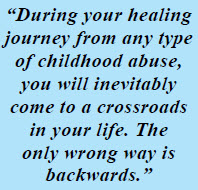 Are you having emotional or sexual problems that are not getting any better?
Are you having emotional or sexual problems that are not getting any better?
Are new events or circumstances making you more aware of past experiences?
If you are a survivor of childhood sexual abuse, know that you are not alone. Survivors have found that acknowledging what has happened to them and speaking about their experiences can be one of the most vital components of the healing process. Some survivors experience a delayed recall of the abuse. Traumatic amnesia is a particular response of the brain that prevents a child from having any conscious recall of the event. Memory loss has a reason. When childhood survivors were young, they were not able to form thoughts or put feelings into words. These memories cannot be forced; they will come back when the brain is ready to handle them. However, triggers (internal or external reminders of the trauma) may bring up unresolved emotional issues. Some examples of these trigger memories may include the way your partner touches you; certain smells or colors; kinds of furniture, vehicles, sounds, or music. These flashbacks are re-experiencing the abuse as if it were occurring in the moment.
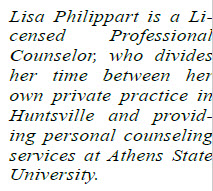 Every survivor has developed coping mechanisms…both healthy and unhealthy ones. Healthy strategies include: exercising, eating comfort foods in moderation, enjoying music, aromatherapy, spending time with safe people, and seeking out counseling. The unhealthy ones are consuming drugs or alcohol, self-harm, and promiscuous sexual activity. A positive coping strategies toolbox is incredibly important to the healing process. Other ways to take care of yourself include:
Every survivor has developed coping mechanisms…both healthy and unhealthy ones. Healthy strategies include: exercising, eating comfort foods in moderation, enjoying music, aromatherapy, spending time with safe people, and seeking out counseling. The unhealthy ones are consuming drugs or alcohol, self-harm, and promiscuous sexual activity. A positive coping strategies toolbox is incredibly important to the healing process. Other ways to take care of yourself include:
- Keeping a journal. Some survivors find that recording thoughts and feelings in a journal or diary helps them manage their emotions.
- Connections with others. Cultivate relationships with people who make you feel good about yourself and make it a priority to spend time with friends and family. Consider joining a support group.
- Learn relaxation or meditation techniques such as prayer or breathing exercises.
- Make time to do activities you enjoy.
- Get involved in a sport or hobby.
- Learn positive self-talk to develop a positive sexual self-concept by replacing old ways of thinking with new healthy ones. (A therapist can help you with this.)
Begin your journey only when you feel ready for it. Go slowly and trust yourself. Sexual healing is a challenging personal growth journey.
By: Lisa Philippart
Licensed Professional Counselor



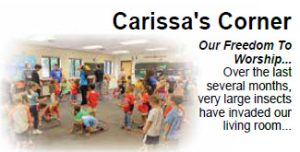


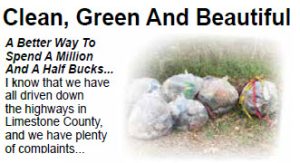


 June 20, 2025
June 20, 2025



